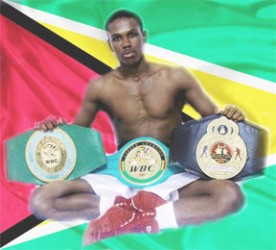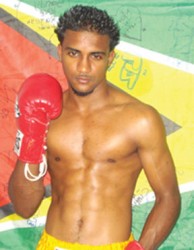When the dust settled in 2012 after the last card at the Cliff Anderson on December 28 where Clive Atwell defined himself as world class material and Elton Dharry stood triumphantly over the hapless Ricardo Blackman of Barbados, the two stood together with Hardy, Edmond Declou and Dexter Marques as champions, WBC CABOFE Champions – WBC top 40 World ranked fighters.
Their success, the Guyana Boxing Board of Control (GBBC) says reflects the startling success of the “Guyana Fight Night Programme” (GFN), the explicit intent of which was to produce world rated Guyanese fighters. Virtually 100% of these fighters’ records were built on the GFN programme.

Almost two years and 11 months, 154 professional fights and 109 amateur fights after its inception on February 24, 2010, GFN and its creators, the GBBC says it has had to reflect and to take stock because the success of the programme has literally changed all of the dynamics surrounding boxing.
“Simply, the sport has evolved quite dramatically in the nearly three years of GFN. So dramatically in fact, that it has become a most enigmatic and perplexing success, producing its own set of dynamics,” a release from the GBBC stated.
“Instead of just moving young fighters forward, intermediate fighters now have to be taken to regional titles and regional title holders must be taken to World Titles. All three levels must operate effectively at the same time and the spectrum of concurrent services needed, ranges from arranging debut fights to matchmaking championship fights, from encouraging a youngster, to trying to guide a young champion to a less risky path up the world ranking and everything in between. Indeed, the board has had to contemplate a much wider range of objectives,” stated the release.
According to the release the GFN itself must evolve to meet the changing needs of the sport if the momentum is to be maintained to fruition, ultimately producing world class fighters. It must simultaneously devise methods to: (1) Take the WBC Cabofe Champions up the WBC ladder to the WBC World Titles.
(2)Take intermediate and local champions, fighters like Kwesi Jones and Mark Austin to regional titles.
(3) Maintain the core principles of GFN to ensure that young fighters can build similar records and become ranked.
“Notably there is enormous talent in the pipeline that requires nurturing and care – examples are young Richard Williamson, Gladwin Dorway, Dilan Allicock and Kishawn Simon among others,” the GBBC release pointed out.

“As such, the GBBC must continue the high activity level which builds not only records but exposure and experience for fighters, corners, cutmen, coaches, referees, judges, supervisors, commentators, announcers, ringside physicians, film crews and even reporters. In short, capacity building for the entire spectrum involved in Guyana’s boxing.
“The GBBC must also maintain support of the amateur aspect of the sport provided by GFN by continuing to provide a platform of national exposure on which they can fight to build their experience and records.
“They must maintain financial support for the amateur association and continue to supply nutritious hampers for participating amateur fighters.
“They must also continue to encourage overseas fighters who are utilizing GFN to help develop their own records; encourage greater Caribbean participation in teams,” stated the release.
The GBBC, the release stated must also “Increase the quality of the television production to international standards (Guyana Fight Night is already shown widely in the Caribbean and may garner much greater acceptance with a higher quality of production); Support coaches such as Seibert Blake, Joseph Murray, Lennox Daniels, Terrence Poole, George Oprecht and Orlan Rogers who have all worked tirelessly for the sport, continue to encourage young fighters to excel and continue to encourage promoters to put on cards supplementing the Board’s activity. The GBBC must also encourage new promoters and strive for greater corporate sponsorship,” stated the release.
In terms of finance the GBBC said it must “Maintain the financial turnover associated with the high activity of the sport. Notably, at an average cost of a GFN card of $1.4M and an average cost of $4.5M to $5.5M for a larger card.
“In the nearly three years of the GFN cards, there have been an estimated turnover of approximately $76.4M. Except for the rental of chairs, advertising and the occasional dancers, virtually one hundred percent of this money goes directly back into the boxing community through boxers’ purses and peripheral costs, says the GBBC which is a distinct economic benefit to the boxing community.
“Perhaps of greater import, GFN has managed to bring together synergies that have worked reasonably well. Committed private sector sponsorship from Digicel, Banks DIH, Ansa Mcal, Giftland OfficeMax and Courtsas well as Guyoil and Geddes Grant on occasion, in combination with reduced cost of the Cliff Anderson and substantial reduction in filming, broadcasting and advertising provided by the Government through the Minister and Director of Sports and NCN, have all played an integral role.
“On the cusp of a much wider Caribbean and international viewership, and a much larger inventory of World Class fighters, the board says it sees 2013 as critical to the further development of the sport and the continuity of the GFN programme as imperative to its success, a challenge that it is eager to undertake.
“Without a doubt, given the track record of the last three years, the requisite work will indeed come from the board but even with its level of enthusiasm, the Board is cognizant that things could be better and will be striving this year for (a) A greater level of corporate sponsorship and participation (b) A new ring and Truss lighting equipment to improve the television product to world standards (c) A larger covered upscale venue which will allow bigger capacity fights in any weather and providing more comfortable amenities for patrons (d) Better management for fighters (e) More viable promotional companies (f) Land – on which it might eventually headquarter itself.”
The GBBC in the release stated that it was undaunted by its self-defined expanded role and buoyed by the continued enthusiasm of local fighters and their coaches as well as the successes of 2012 which yielded 49 professional fights, 28 amateur fights and five world rated fighters adding that it was looking to 2013 to be a gateway year to the international acclaim for Guyana and Guyanese boxers which seems but a moment away.
The GBBC, in the release said that it was prepared to take the necessary steps to continue the GFN programme as a permanent facility that allows young fighters a forum at which skills may be developed, experience acquired and exposure gained.
“It is also the Board’s intention to lift the standard of the production to an internationally acceptable level,” the GBBC release added.
The GBBC also said that it wanted to acknowledge with gratitude, the sterling support it received from its sponsors and from the local press, not only during the course of 2012 but indeed, from the inception of the Guyana Fight Night Programme.





